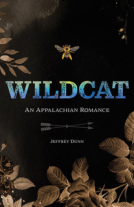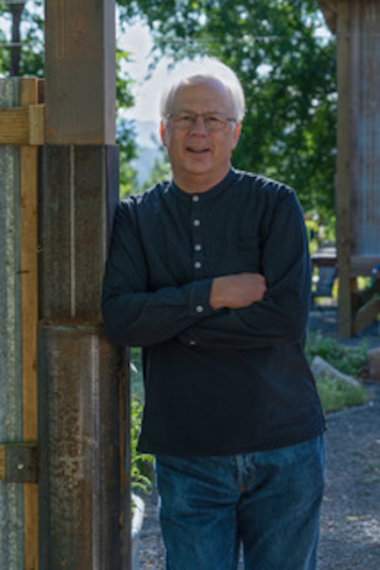As featured on NPR and Medium, Jeffrey Dunn is a critically acclaimed author and award-winning teacher. His works of cultural fiction include the Washington State Book Award-nominated Radio Free Olympia, the surreal Dream Fishing the Little Spokane, his upcoming Wildcat, An Appalachian Romance as well as Whiskey Rebel, and his poetry collection Hubcap Collection Plate. His Ph.D. in English literature and cultural studies laid the foundation for his 41-year teaching career where he focused on addressing student learning issues and implementing educational programs at the local, state, and national levels. Embracing his dyslexia as a gift, this dream fisher and history miner roams the woods whenever possible. Meet Jeffrey:
Did you always want to be an author? I was a happy child until I went to school. I didn’t like the process. On the third day, my teacher turned her back, and I ran home. My mom sent me back the next day. The umbilical cord broken, I held a grudge.
I held that grudge until the ninth grade. That enmity was broken when my new English teacher, Mr. David Srellec, dropped our grammar book out his second story classroom window. That got my attention. Maybe there was hope. Then, Mr. Strellec read us some Winnie the Pooh, not because it was in the textbook or was part of the curriculum, just because he wanted to share the magic. That also got my attention.
Not long after, he read us Richard Brautigan’s post-apocalyptic, proto hippie fantasy In Watermelon Sugar. I learned that when the narrator was nine years old, he watched tigers eat his parents, and before long, quite naturally, the tigers helped the narrator with his arithmetic. There was so much to imagine: a sun that shines a different color every day, an infinite garbage dump called The Forgotten Works, a living room with a couch beside a river, and Margaret, the jilted ex, who always crosses the bridge to the narrator’s shack and steps on the only board that squeaks.
And just like the narrator, I wanted to live in a shack and not have a regular name, “Just call me whatever is in your mind,” and just like him, I wanted a proto-hippy girlfriend who made hot cakes and painted and who made “a long and slow love” possible. “Wow,” I thought, “apparently, I can use my imagination to make a new self and my own stories.” Armed with this knowledge, I began writing stories. Oh, I’d written a few stories before, but I also played baseball and hunted for polliwogs. But this was my first serious story, one written in response to In Watermelon Sugar, and when I handed it to Mr. Strellec, he read it to the class, my story where a guy in his prison cell chats with an emperor penguin. Mr. Strellec said he liked it, and I was on my way.
What is your most recent book and what inspired you to write it? I found the seed for my new novel Wildcat: An Appalachian Romance when I came across some oral history about Braeburn, PA. The article made much mention of Hotel Braeburn. Although I’d grown up only three miles away, I wasn’t aware that there had ever been a Hotel Braeburn. How could that be? I played Little League baseball just up the hill. In high school, I’d cruised with friends through Braeburn countless times. I went to school  with kids from Braeburn.
with kids from Braeburn.
The soil for the seed came my experience living in Pittsburgh during the 1980s. Twenty-five steel mills closed. One hundred thousand people left the area. Burrell High School—the place from where I’d graduated—lost fifty percent of its student population. To this day, I’m amazed, dumbfounded, and bewildered that this crushing socio-economic catastrophe went down without a bang, just a whimper.
Then, the alchemy began, flowing out as a series of what ifs. What if Hotel Braeburn had never burned in 1969 and had reopened as a collective eating and dining establishment? What if a man like me retired and returned to Wildcat, a fictional Appalachian Rust Best village? What if Wildcat had transformed its dead coal mine and iron works into sustainable businesses? What if the narrator had a dark past, one with a Wildcat girl who coincidentally, just like him, had just returned? What if the narrator moved into Hotel Wildcat and began writing a memoir? What if . . .Wildcat, An Appalachian Romance is a response to all these questions and a bang without the whimper.
What are you most excited about with this book? I found magic in reality and lyricism in grit.
What advice would you give to someone wanting to succeed in your professional industry? Find good people. Unfortunately, we need a good bs detector. There are many charlatans in this world and just as many people who want you to write their book. Finding Izzard Ink Publishing was a godsend. Izzard’s Tim McConnehey led me to my developmental editors, Skye Loyd and Fran Lebowitz. Simply brilliant. Tim also found my cover designer Andrea Ho and interior designer Daniel Lagin. No one does it all.
How do you structure your day and make time for writing? I write cultural fiction in the morning (cultural criticism and publicity responses in the afternoon). I begin by writing about 200 words, and then the next morning, I revise those words before adding more. On day three, I’m back at revising the first 200 before moving on. This will continue for a week to ten days until I’m 10+ pages in and fairly satisfied with the first 200 words. Nothing stops me from returning to pages and adding, deleting, or revising as more pages unfold. Ten years after finishing my novel Radio Free Olympia, I went back and deleted 50 of the first 100 pages and added 50 new.
Just as important, my writing depends on awareness of all that is not me is. I walk among trees every day (weather permitting), listen to all that is said around me, and pay attention to where my mind goes when I’m not writing, especially in the shower. My writing sessions are always less than two hours, and then I clean, cook, walk the dog — anything but write, because the writing process continues in my head but in a different way. A good night’s sleep brings new perspective. I also read widely, often the biographies of interesting artists and musicians. I’m fascinated by other’s artistic process.
What book uplifts you? Rick Rubin’s The Creative Act: A Way of Being. Here, Rubin explicates the process he used/s to find and refine the alchemy he has lent to so many, most notably the late Johnny Cash. He asks artists to erase their egos and forget their expectations in order to enable a clear channel to emerge through which the best work comes. No five steps . . . no outline . . . no hard and fast dos and don’ts, which will frustrate those hung up on being an “author” or “famous” or “rich” or “seen.” Rubin sees such ego expectations as noise in the machine of art, and if one is truly dedicated to the best work, then art first, later que sera. And if all this feels a bit hippy dippy, CA Zen, not to worry. He provides chapter after chapter on different directions to go and activities to try. Keep what works . . . throw the rest out . . . which is to say, it’s the art, stupid!
Learn more about Jeffrey Dunn and all of his books via his website.


No comments yet.